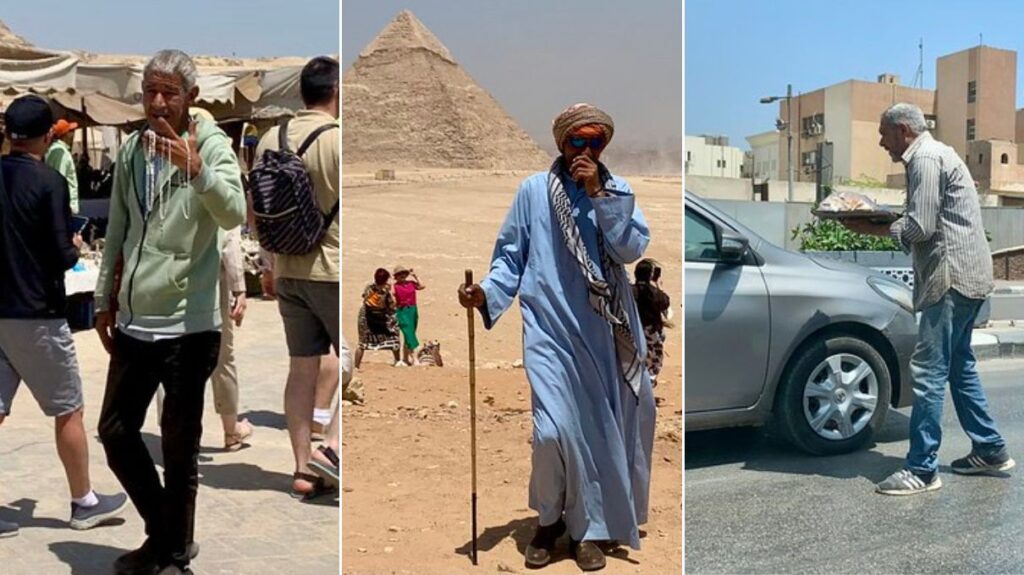Our 2025 Egyptian trip was a lifetime dream come true. A friend recently asked me to join a travel group specific to Egypt on Facebook to help fellow travelers out, so I did. I likely won’t remain in the group too long — it is full of Egyptians offering services like cars, rentals, tours, etc., more than travelers helping each other out. And I get it — the tourism hustle is high in Egypt, and this post is about why that is. And while the hustle might be annoying, we should not be offended.
The tourism hustle is high in Egypt
I’ll share what I’ve learned in this post and hope to give you enough insight for a gracious decline, should you chose not to employ services or buy goods. On the other hand, you might also decide to hire a guide, buy a small trinket, or leave a large tip.
YouTube vloggers exaggerate
Countless times in Egypt we politely declined incessant offers from souvenir vendors, tour operators, site guides and taxi drivers. We knew that would happen because before we went to Egypt, we watched some YouTube vloggers share their experiences with these dreaded touts. Their videos showed super-aggressive Egyptians.
It turns out these YouTube vloggers were actually more aggressive than the invasive touts. The vloggers really provoked touts by engaging them in absurd ways for the camera, the algorithyms, the views.
While the tourism hustle is high in Egypt, we quickly figured out how to handle these invasive situations: simply don’t engage.
We said ‘no thank you’ politely one time to an offer, and kept walking. When asked the inevitable follow-up conversation starter ‘where are you from’, we silently kept walking. It is difficult to ignore people who are talking to you, but you’ve already set your boundary a polite no, and you owe them no more.
Sometimes, spouse Theo answered the question ‘where are you from’, and that’s when the touts became more aggressive, as we saw in the YouTube videos. They took any engagement as a sign to keep pushing their goods or services.
Sure, the touts can really lay it on thick! But we proved they will leave you alone – like any other tourist-driven place on Earth – if you are polite and firm with your ‘no’ and don’t engage with them. They don’t want to waste their time on you if you’re not going to buy.
Even us vagabonds look wealthy to Egyptians
Another way we avoided aggressive approaches is by dressing our part: we are vagabonds. Budget slow travelers in early retirement. We don’t own expensive clothing or jewelry.
Theo let his hair down, didn’t shave, and wore his usual shorts and T-shirts.
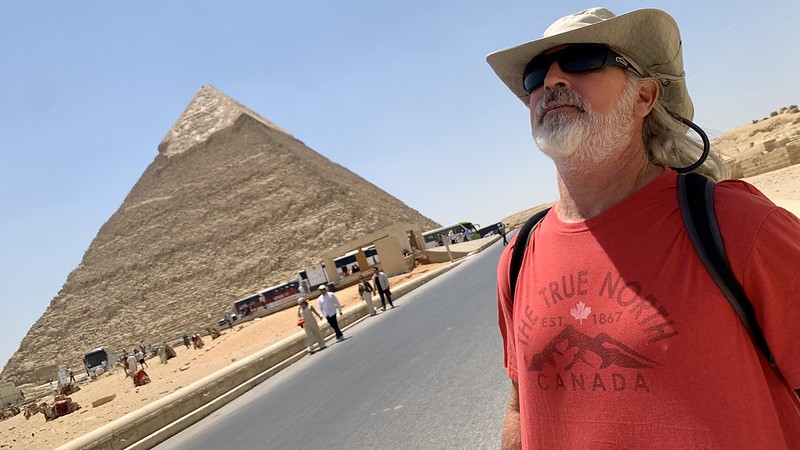
Upon his return from a solo trip to a nearby store looking something like the photo above, Theo reported: ‘no one said anything to me – not one word’.
As global vagabonds, we have vintage devices. Theo’s phone cost $100 new when he bought it more than three years ago. I’m typing this on a 10-year ultra laptop that Microsoft will stop supporting in a few months. My pictures are with a near-obsolete iPhone Xs.
Vagabond: (n) A person who wanders from place to place without a home or job. (adj) Having no settled home.
To fellow Americans, we look like regular people without exorbitant wealth. To Egyptians desperate to make money, we look like sources of income.
I don’t blame them at all, and neither will you when you find out what average Egyptians earn.
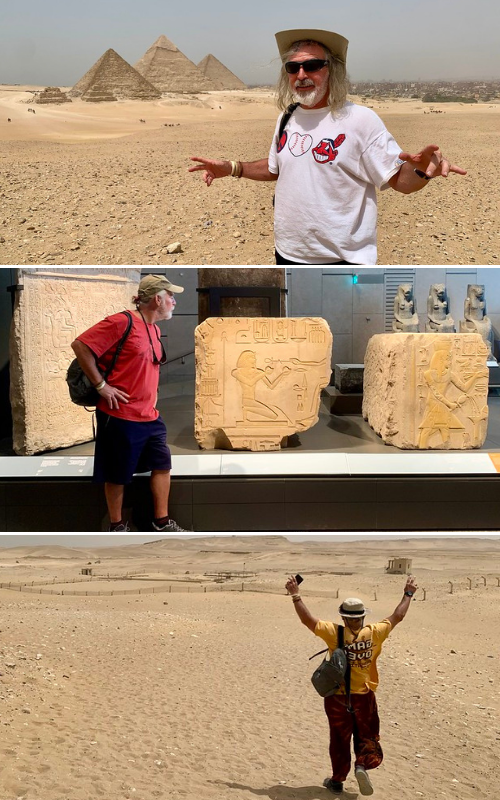
This is why the tourism hustle is high in Egypt
I don’t blame Egyptians for trying, and trying and trying…. to get us tourists to buy some good or service.
It’s basic math. First, I’ll show you income examples, then the poverty level, and some other fun facts about the country you’ll be visiting.
So stay open minded and remember: kindness matters.
Income examples
The average tourism-related job around Cairo brings in about $150 USD per month. By the average tourism-related job, I’m talking about the people selling souvenirs, the cooks, the waiters at lower-cost eateries, people selling water and soda, etc.
In contrast, camel and horse operators and taxi drivers can make $150 on a good day, but they often support extended families who are not earning much, if any, income.
Egyptians who don’t work in tourism make as little as $65 a month — they work every day, no days off.
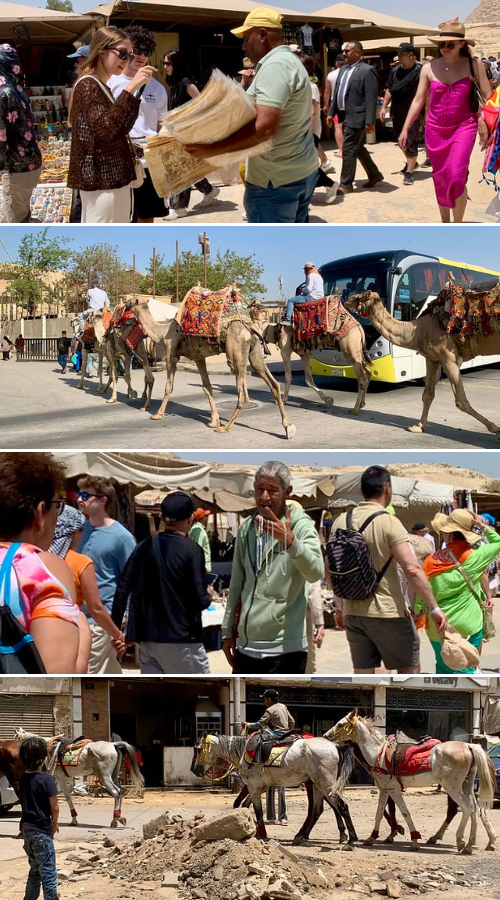
Egyptian economy
The World Bank puts Egypt’s poverty rate at 33.5%.
In early 2025, for the sixth time in the last three years, the Egyptian government increased subsidies for food, fuel, and health care.
Egyptian pound devaluations have historically been a problem. Things went downhill when Egypt imposed tariffs some 50-60 years ago to curb ballooning trade deficits. Next, major tariffs about a decade ago caused more problems. But the most recent pound instability stemmed from poor fiscal decisions at a time when internal debt was rising and government subsidies for people’s every day needs reached record highs — just as inflation went up again.
This led to a major interest rate hike and the latest bailouts: a new International Monetary Fund loan and new investment by the United Arab Emirates for more tourism development.
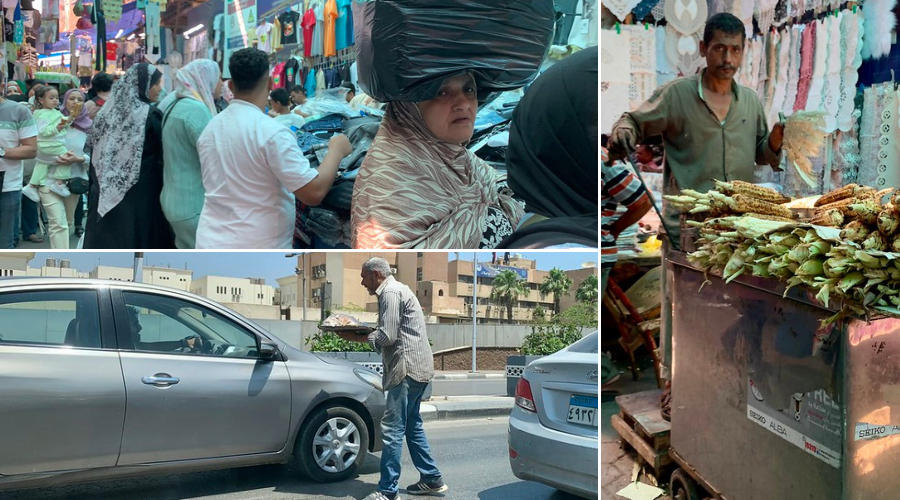
We know this story from other countries: the rich manipulate the system to benefit themselves – everyone else be damned.
Things were such a mess for ‘regular’ people that as recently as 2024, tour operators and accommodation owners demanded foreign tourists pay in U.S. dollars or euros. However, during our 2025 visit, everyone accepted Egyptian pounds, because things seemed to be stabilizing. (For a deeper look at Egypt’s financial problems, the International Monetary Fund set up a Q+A page after the last intervention in 2024.)
For us American budget slow travelers in early retirement, Egypt is a bargain like few other places. One eye-popping example: one liter of milk is just 72 cents in the chain supermarket Carrefour. Easy for us – not possible for many locals.
We privileged Westerners still have it good, despite the economic uncertainty with the global shifting of superpowers. How long will that last? Unknown – especially for us Americans.
That’s one reason we say travel now – because Life is Now. And it’s one reason we try to be as generous as we can.
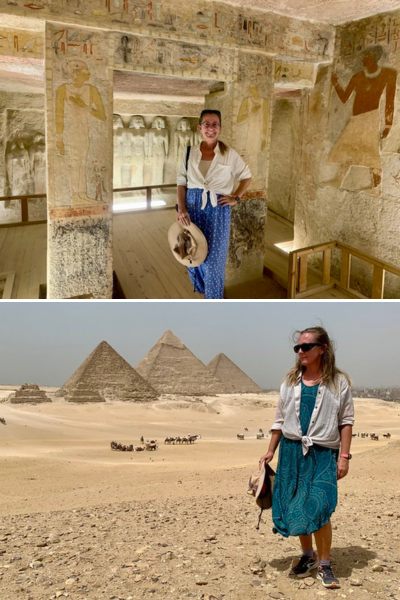
Don’t miss where we stayed in Giza! We highly recommend it. It overlooks the pyramids and was the best value bed & breakfast – with a great host to boot! Get the details in a special ‘Kortn’s Crib’ post.
The best authentic stay on Elephantine Island! Get the details in this post.
Thanks for reading, “The tourism hustle is high in Egypt, and this is why.”
About Ellen

Ellen’s sobriety date is April 13, 2010. She left the news business in 2015 to travel the world on a budget with spouse Theo in early retirement.
She was diagnosed with breast cancer in 2018 while traveling and had a double mastectomy without reconstruction in Croatia. She recovered, and kept traveling the world as a ‘flattie‘.


